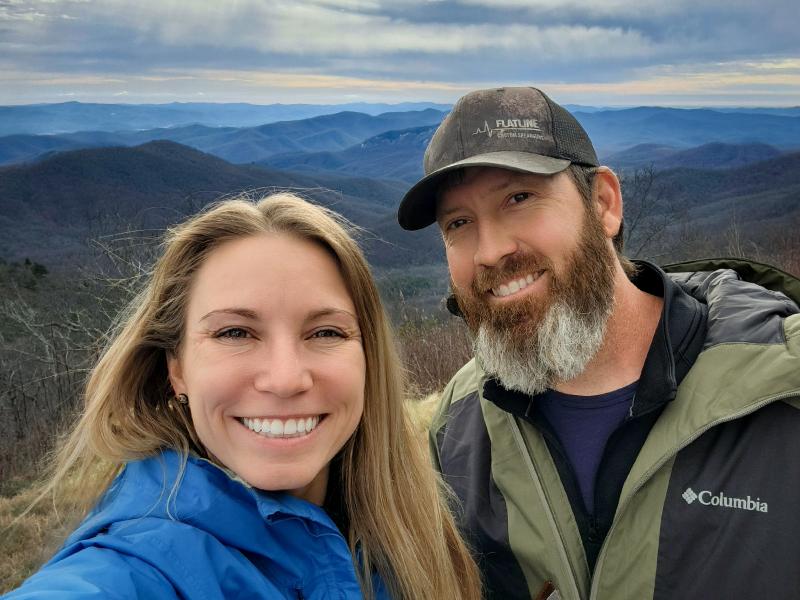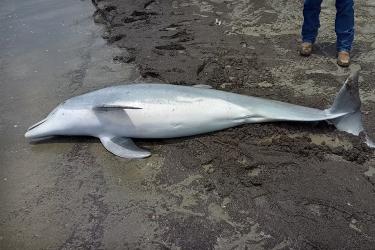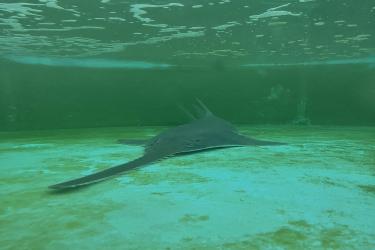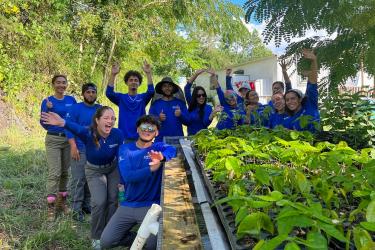Where did you grow up?
I was born in New Jersey near the shore, but moved to Florida when I was young. My family vacationed in Cape Cod, Massachusetts, which is where my addiction to saltwater began. As a young kid, I’d collect critters from the bay and put them in buckets together to see what would happen. Later I’d learn that these were called “predator–prey functional response experiments” and that it was possible to get a job studying saltwater critters like this for life.
Where did you go to school and in what subject did you get your degree(s)?
I earned my bachelor’s degree at Florida State University (go ‘Noles!) where I studied biology and marine resource ecology. I did some undergraduate research on various coastal invertebrates such as crown conchs and hermit crabs until I was able to splash into scuba diving, which opened up a whole new world of opportunity. I learned to conduct reef fish surveys in the Gulf of Mexico, participated in research on red and goliath groupers, and scored an internship studying invasive lionfish in the Florida Keys.
I initiated and coordinated the Lionfish Outreach Program with the Florida Fish and Wildlife Conservation Commission for a few years. Then I pursued my master’s in marine science and marine resource assessment at the University of South Florida College of Marine Science. In Chris Stallings’ Fish Ecology Lab, I helped lead underwater reef fish surveys and collected fish samples via spearfishing to study production on natural versus artificial reefs. My thesis research was focused on hogfish life history and habitat use using stable isotope analysis of their eye lenses.
How did you come to work at the Southeast Fisheries Science Center?
Throughout every step of my education and career journey, I always engaged with people—from kindergarten students to fishermen—about science and the ocean. This involved everything from bringing touch tanks with sea creatures into the classroom, to organizing workshops with the spearfishing community to develop innovative ways to get them involved in invasive lionfish control. I have even spent time explaining stable isotope ecology to my local dive clubs. While I’ve always had a passion for science itself, I find even more joy and satisfaction in sharing scientific knowledge with others and helping them become stewards of our ocean and its inhabitants.
Before joining NOAA Fisheries, I spent several years with the U.S. Geological Survey leading communications for the St. Petersburg Coastal and Marine Science Center. That’s where I “got my feet wet” in federal science communications. I loved my career there, but I missed the fisheries world, so I threw my name into the hat for this position.
What do you do at the science center?
I’m now the communications manager for NOAA’s Southeast Fisheries Science Center. Here, a talented group of researchers, analysts, and support staff work together to “provide the scientific advice and data needed to effectively manage the living resources of the Southeast region and Atlantic high seas.” Ultimately, my job is to showcase the center’s value, expertise, and accomplishments to diverse stakeholders in support of this mission.
What do you like most about your position?
I often tell people that I think I have the best job at the center because I get to learn about really cool new science every single day and find the best way to share that news with the world. Each day brings opportunities to engage with incredibly smart and talented people, be “wowed” by new findings, and explore creative and innovative methods to get the word out.
What advice would you have for someone interested in a career at NOAA Fisheries?
Be persistent, and keep an open mind. Consider taking advantage of new opportunities even if they may not seem like the “perfect fit.” Each and every step I’ve taken along my winding journey has helped me get to where I am today and helped me diversify my skills and learn new perspectives. I am thankful for all of those experiences, even though some felt a bit off track at the time.
Is there a book, quote, or person that influenced you to be the person that you are today? Tell us why.
My family, particularly my parents and grandparents. They always taught me to celebrate all the little wins—and big ones, of course—and to never give up on my goals, no matter how challenging life becomes.
As a professional science communicator, I also look up to Neil Degrasse Tyson—astrophysicist, writer, director of the Hayden Planetarium, and host of the podcast Star Talk—for always finding ways to make science fun.
A couple of my favorite quotes:
“Our greatest glory is not in never falling, but in rising every time we fall.” - The Citizen of the World or Letters From a Chinese Philosopher, often attributed to Confucius
“Nothing in science has any value to society if it is not communicated.” - Anne Roe
What do you like to do outside of work?
Truly anything outside or underwater. My favorite pastimes are spearfishing, hiking/backpacking, and running. Lately, I’ve been spending more time inshore fishing and learning to hunt—on land! I also love spending time with friends and family—including my husband, Travis, and our dogs Teak and Brody.





